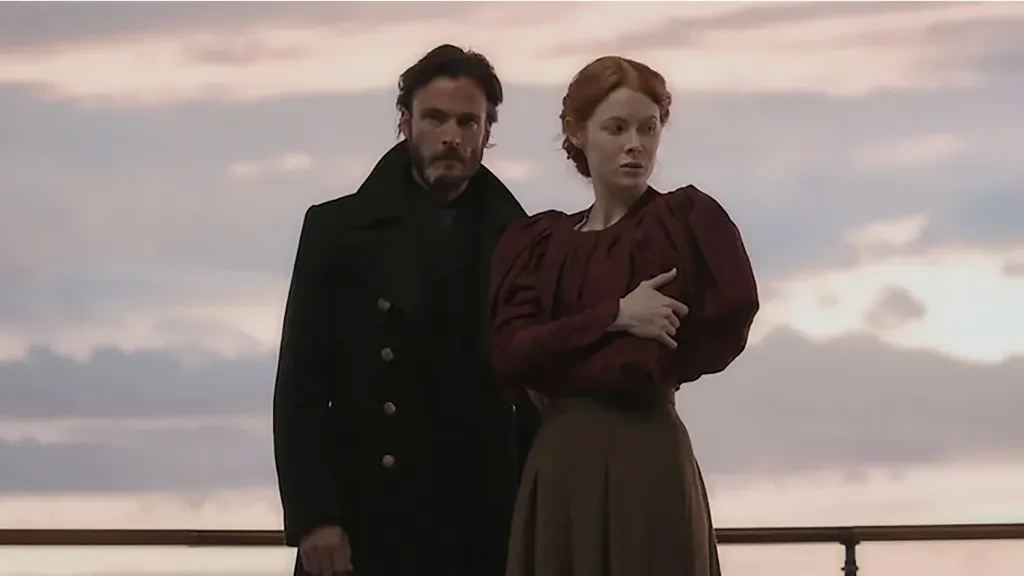In the age of streaming entertainment, it’s often a frustrating reality that really interesting series are cut short. It’s something you hear fans talk about all the time, noting that a beloved Netflix series has been cancelled by the streamer after a too-few number of seasons. But while the loss of any good show is disappointing, there is sometimes a silver lining for viewers. Sometimes, what ends up happening is that the show has ties to another series that was equally as interesting, giving viewers at least a little more to dig into before having to say goodbye, and that’s the case when it comes to this one, 1-season sci-fi series and what might be Netflix’s best time travel show ever.
Videos by ComicBook.com
Back in 2022, Netflix debuted the series 1899. From creators Baran bo Odar and Jantje Friese, 1899 was a multilingual German science fiction series following European immigrants on a ship on their way to America. On their journey, the ship encounters a second, mysterious ship that had previously been believed to be missing. The series ended up cancelled after just one season, but not before taking fans on a wild ride with an epic scale mystery that went from a seemingly straightforward historical drama to a full on sci-fi psychological horror and while the show’s abrupt end left fans with a lot more questions than answers, 1899 is still an incredible watch, especially for fans of Netflix’s perfect time travel series, Dark.
1899 Is the Perfect Follow Up if You Liked Dark

For those who aren’t familiar, Dark may just be the best time-travel series Netflix has ever released. From the same creators as 1899, Dark ran for three seasons starting in 2017. The series, which is a fully completed series as it was able to tell its entire planned trilogy during its run, told the story of the town of Winden, weaving across decades and dimensions, following four families who are entangled by a strange phenomenon. While the series flew under the radar for some, it was a stunning example of a time travel story done right in that it kept careful track of its time travel mechanics and story threads. Dark was a series where no detail was throwaway; everything you saw was important and ultimately lead somewhere, which made the series’ ending even more powerful and satisfying for viewers.
Coming just a couple of years after Dark, 1899 is not a sequel or a direct follow-up, per-se. Don’t expect to find characters from Dark popping up on the steamship Kerberos in 1899. In fact, that’s something that Odar even directly indicated at one point that the two shows are not related. However, while Dark and 1899 aren’t tied directly, they do share a lot of the same DNA and it extends beyond the creative force behind them. Both 1899 and Dark are predicated on a solid mystery — in Dark, it’s a missing child while in 1899, it’s a missing ghost ship — and that mystery soon grows into something much larger and much darker as it grows stranger and more complex and compelling. Both series also keep their storytelling tight and carefully controlled, meaning that the details in 1899 are just as significant as the details in Dark. Paying attention to everything, in both series, has great narrative payoff.
There is also a complete subversion of expectation of where things are going with both series. Dark is richly detailed and gloomy and at times, the viewer has no idea where things are going. That is, after all, the nature of any good time travel or time bending story. Time travel isn’t the source of the confusion in 1899, but the same ideas of time and details play a huge role as well. While Dark has its players dealing with a 33-year time loop of predetermined events, 1899 doesn’t see its characters spanning generations with its events, but the idea of characters being locked into a specific span of time is a major component — and makes the ending even more shocking. While Dark took fans deep into the time travel element, 1899’s final moments hit fans hard with a more science fiction reveal leaving viewers to question everything.
1899 Brilliantly Follows Dark’s Example of Exploring Existential Questions in Different Ways

While 1899 may not have gotten the space and time to fully tell its story, it still stands as a perfect follow up to Dark in that it, like Dark, explores some of the deepest existential questions in unique ways. Fundamentally, both 1899 and Dark are both about being trapped, just in different ways. While Dark explored that idea through the lens of free will and fate, 1899 took a different approach, examining the concept through something more technological, suggesting future seasons would dig just as deeply into the horror of the human condition and the meaning of reality, whatever it is. Sadly, we’ll never know exactly how it would have played out, but at least for fans, 1899’s sole season exists to enhance the Dark experience — and give viewers a lot to think about.
Both Dark and 1899 are streaming on Netflix.
What do you think? Leave a comment below and join the conversation now in the ComicBook Forum!









